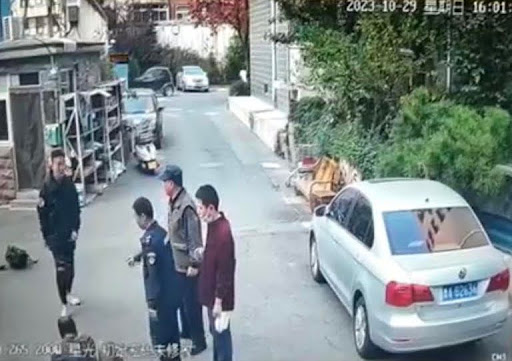After spending three years keeping a low profile in order to avoid Chinese authorities, vocal Hui Muslim poet Cui Haoxin — better known by his pen name An Ran — was attacked by an anonymous man near his home in Shandong, an associate said.
Cui was assaulted on Oct. 29 while he was retrieving a parcel near his residential compound, a person familiar with the matter told Radio Free Asia (RFA) Mandarin, under anonymity to avoid repercussions.
“This man, whom An Ran had never seen before, was waiting for him on a motorbike near the shelves in his residential community,” the person said.
“He didn’t say anything but shoved An Ran to one side and started shuffling through all of the packages… then he asked if he could move over [so An Ran could look for his package], and the guy immediately started yelling and cursing at him,” the source added.
The man then proceeded to push Cui down on the ground before beating him up, a blog post describing the incident read.
Success
You are now signed up for our newsletter
Success
Check your email to complete sign up
“He was hitting so fast and so hard that I couldn’t fight back — I just tried to block the blows,” Cui said. “The punches hit home, and now my temples, eyes and the back of my head are swollen and painful.”
Cui tried to counter after the attacker fell, but the latter recovered, beating Cui up “until he was tired,” he wrote. The poet added that his eyesight is now “significantly reduced.”
READ MORE:
- Death of Former Chinese Premier Li Keqiang Puts Pressure on Xi, Communist Leadership
- Canadian Banks Blocking Overseas Hongkongers from Accessing $1.1 Billion in Pension Funds
- Women in China Urged To Spearhead ‘New Trend of Family’ Amid Dwindling Birth Rate
Poet repressed
According to RFA, Cui was detained by Chinese authorities three years ago for “picking quarrels and stirring up trouble.” He was charged for posting on Twitter, condemning Beijing for its dreadful treatment of Muslims in Xinjiang.
In 2018, he shared his fears that his fellow people would suffer as leader Xi Jinping heightened his religious repression of Muslims nationwide, in what was called “Sinicizing” religion. This movement led to arrests and shutdowns on places of prayer.
“One has dignity. For a person, it is his or her bottom-line,” he said. “If the persecution is too unbearable, if something happens, as I said, there could be a disaster.”
A friend of his told RFA that he was released on “bail, pending trial” on Feb. 21, 2020, when he was warned not to post anything on social media or communicate with foreign journalists. Since then, he has remained incognito from social media, ceasing his posts on his former accounts.
“The state security police warned his family that he would be sent to prison if he gave interviews to foreign journalists,” the friend said. “That would have left An Ran’s parents without anyone to take care of them, so An Ran said nothing for three years, not even a comment or a picture.”
“He was depressed and almost at the point of mental collapse when he got out [from detention,” the friend added.
U.S.-based activist Sulaiman Gu claimed that Cui’s blog post of the attack was the first news from him in three years.
“An Ran really did disappear completely over the past three years,” he said. “Nobody knew what had happened to him.”
Gu later said Cui was sent to “a big prison,” placed under heavy surveillance and restrictions by the police.
Prior to his detainment, Cui referred to Xinjiang as having a “planet-sized impression” on him.
“Xinjiang, that massive presence that defies expression, left a planet-sized impression on me that is ineradicable,” he wrote in an article which also cited the crisis in Syria and the Arab Spring.
“This is a land of poetry and song… when I headed out west to the Central Asian city of Kashgar, no sooner had I arrived than I made straight for the tomb of an ancient poet, and raised my hands in prayer for him beside the dusty tomb swathed in green silk.”













